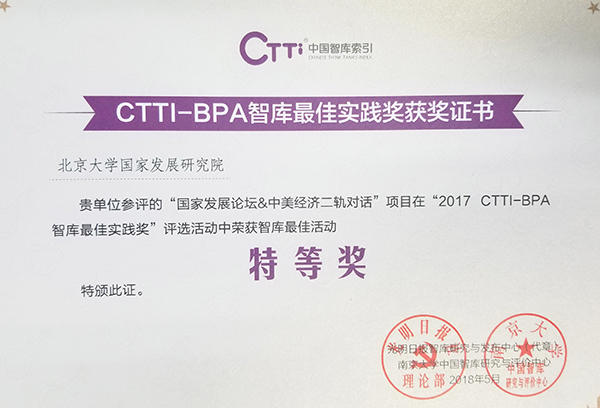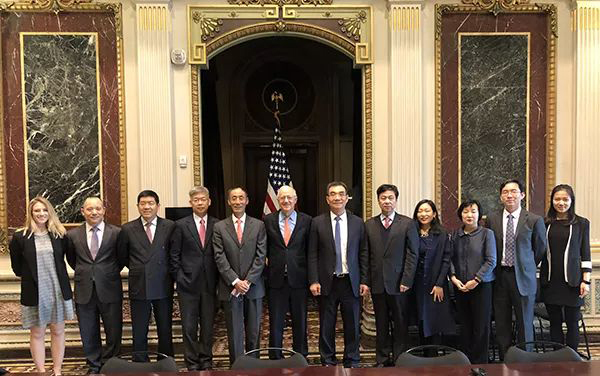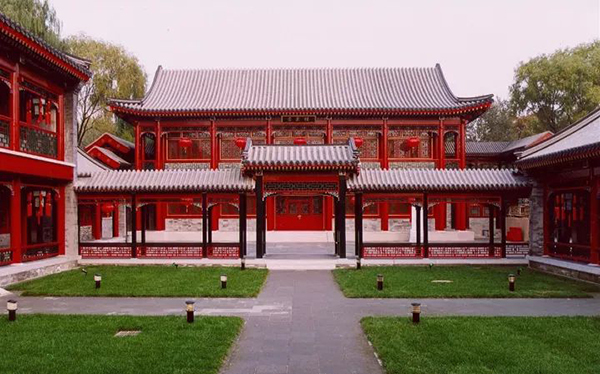
The selection results for the 2017 CTTI-BPA awards, jointly sponsored by the Think Tank Research and Release Center of Guangming Daily and China Think Tank Research and Evaluation Center at Nanjing University, based on CTTI, and in conjunction with review from a panel of experts, were unveiled on May 19, 2018.
The “China-US Track II Economic Dialogue” and “National Development Forum”, events organized by the National School of Development at Peking University, won the Grand Prize for Best Event

At the keynote report segment of the award presentation, Deputy Director of the National School of Development at Peking University (NSD) and member of Currency Policy Committee of the People's Bank of China Huang Yiping, who cited specific practices NSD had adopted in establishing its think tank, proposed three major aspects crucial to the development of think tanks - independence, professionalism and effectiveness - and emphasized that the crux to building a think tank is people, and the grooming of scholars who have national and family oriented sentiments and who regard serving the world as their mission.
Statistics revealed 441 project applications were submitted by 23 provinces, municipals and autonomous regions. Excluding applications that were not signed and affixed with a seal, 416 official applications were submitted. In particular, applications for Best Research Reports numbered 216, and for Best Event, 166; there were 34 Best Management applications recommended by various provinces and municipals. After online communication and review, 78 applications were shortlisted. The panel of experts then convened a final review meeting, and by voting, nominated 51 applications for the 2017 CTTI-BPA prizes. Three prize categories were established: Best Report, Best Management and Best Event.
[China-U.S. Track II Economic Dialogue]
Jointly organized by the National School of Development at Peking University and the National Committee on U.S.-China Relations, this program aims to provide a platform for Chinese and American scholars, business leaders and other relevant persons to discuss medium- to longer-term issues concerning bilateral economic, financial and trade relations, and their impact on the global economic landscape. The outcome of the dialogue is submitted to the relevant ministries and departments of China and the US as reference for decision-making by the two governments, and helps scholars and businesses of the two countries digest the positive outcome of dialogue between the two governments, thus increasing mutual understanding and trust between the people of the two nations. The event is held twice a year, alternating between New York and Beijing. To date, 17 dialogues have been successfully held. The delegates have repeatedly met central government leaders as well as relevant leaders of the central bank, the Ministry of Finance and the Ministry of Commerce. Central government leaders have often written official comments about the outcome of the dialogues and exchanges.

[China-U.S. Track II Dialogue on Healthcare]
As one of the “events included in China-US cultural exchange mechanism”, the “China-US Track II Dialogue on Healthcare”, jointly organized by the National School of Development at Peking University and the National Committee on U.S.-China Relations, is held annually, alternating between Washington DC in the US and Beijing. Academicians, business leaders and other relevant persons from the two countries meet to discuss key medical and healthcare issues pertinent to China and the US. As one of the “healthcare events included in China-US cultural exchange mechanism”, the outcome of the dialogue is submitted to the relevant ministries and departments of China and the US as reference for decision-making by the two governments.
[National Development Forum]
Organized by the National School of Development at Peking University, with “Focus-National Development, Langrun-Knowledge based on Investigation[CA1] ” as the tenet, and rooted in China’s reform and development as well as modern practices, the Forum provides a high-level exchange platform for those in the fields of politics, business and academia to systematically conclude major advances in national development, forecast changes in the global landscape related to the rise and fall of future growth of the nation, and to carry out discussions and exchanges on major strategies, systems and institutions as well as policies. The Forum brings together the relevant heads of Central government and State Council related ministries and commissions, as well as important, influential and renowned domestic and overseas scholars and business leaders, and is widely covered by the media such as People’s Daily, Xinhua Press, Sina, Sohu, Netease, Tencent, Phoenix, and Today’s Headlines. More than 1.5 million people watched the program live online via the various network platforms, giving full play to NSD’s role as the first batch of national high-level think tank in policy interpretation, guiding public opinion, advising the government and enlightening the public.

[Langrun · Policy Talk]
This Forum was established in 2013, and is an important event of the 20th anniversary of the founding of the National School of Development at Peking University. It is also a key ongoing measure of the establishment of a strategic think tank by NSD.
Rooted in knowledge based on investigation, the Forum examines public policy options. Professors who participate in Langrun · Policy Talk have been active on the front lines of policy analysis since reforms first began. In the last two decades, many professors have participated in almost all of the discussions pertaining to major reform issues. The many featured events of Langrun · Policy Talk, such as “Interpreting the Third Plenary Session of the 18th CPC Central Committee”, have attracted many listeners, and has had an important impact of society.
[Conference of CMRC China Economic Observer (CEO)]
This Conference is a long-term work project that commenced at the beginning of 2005. Its goal is to leverage the research resources of the National School of Development to analyze and comment on issues concerning China’s macroeconomic condition, the supply and demand as well as price of commodities in the domestic and overseas markets, as well as institutions, systems and policies relevant to the investment environment, thus strengthening CCER’s relationship with all walks of life so as to contribute to the next decade of growth for CCER as well as to China’s economic growth. Relevant domestic experts are invited to the Conference to discuss the relevant topics and to provide quarterly forecasts for China’s key macroeconomic indicators.
[National School of Development at Peking University Think tank]
Adhering to the “small organization, big network” philosophy, the National School of Development at Peking University has aggregated the best brains of PKU, and indeed, that of the nation and the world, including Justin Yifu Lin, the first Chief Economist of the World Bank from a developing country, PBOC president Yi Gang, Zhou Qiren, Zhang Weiying, Song Guoqing, Lu Feng, Yao Yang, Huang Yiping, and Liu Guo’en. The think tank closely monitors major issues in the process of China’s socioeconomic development and global impact, and conducts research. It has produced influential policy recommendations in respect of government and market relations, new rural development, land issues, SOE reforms, telecommunications reform, stock market governance, population policies, economic structural adjustments as well as other major issues, and has repeatedly received official comments from General Secretary Xi Jinping, Premier Li Keqiang, and other central government leaders. It has played a key role in giving a responsible account of the China story, constructing a system of Chinese social science discourse, nurturing social scientists for a new era and other areas.
The National School of Development at Peking University was one of the first 25 national high-end think tank pilot entities, and has been consecutively ranked first among think tanks of schools of higher learning in The China Think Tank Report published by Shanghai Academy of Social Sciences for years. It has been consistently rated as an influential think tank, and has become the indisputable leader among think tanks of schools of higher learning in China.
